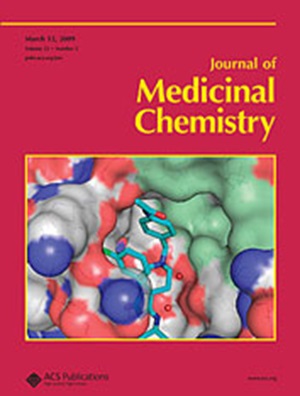针对肿瘤靶点MAGE-A4的下一代细胞渗透性肽抑制剂的开发。
IF 6.8
1区 医学
Q1 CHEMISTRY, MEDICINAL
引用次数: 0
摘要
黑色素瘤相关抗原A4 (MAGE-A4)是一种癌症/睾丸抗原(CTA),可与E3泛素连接酶RAD18相互作用,增强肿瘤细胞的DNA损伤耐受性。在这里,我们报告了先前报道的一种有效但细胞不渗透的环肽的结构指导优化,称为MTP-1。在之前肽类抑制剂的基础上,我们的目标是开发具有显著改善细胞通透性的下一代肽类抑制剂。通过采用mRNA显示位点饱和突变文库(SSML)的系统构效关系(SAR)研究和改良环化策略的战略性支架优化,我们开发了第一个MAGE-A4的细胞渗透性肽抑制剂JWP24。多种检测结果表明细胞内靶标结合,保持结合效力,在有效浓度下无细胞毒性。这项研究为将有效但更大的大环肽抑制剂转化为细胞渗透性探针提供了一个有价值的框架。这里提出的工作表明进一步建立MAGE-A4作为化学上可处理的肿瘤靶点的进展。本文章由计算机程序翻译,如有差异,请以英文原文为准。
Development of Next Generation Cell-Permeable Peptide Inhibitors for the Oncological Target MAGE-A4.
Melanoma-associated antigen A4 (MAGE-A4) is a cancer/testis antigen (CTA) that interacts with the E3 ubiquitin ligase RAD18 to enhance DNA damage tolerance in tumor cells. Here, we report the structure-guided optimization of a previously reported potent but cell-impermeable cyclic peptide, called MTP-1. Building off our previous peptide inhibitor efforts, we aimed to develop next-generation peptide inhibitors with significantly improved cell permeability. Through systematic structure-activity relationship (SAR) studies employing an mRNA display site-saturation mutagenesis library (SSML) and strategic scaffold optimization with modified cyclization strategy, we developed JWP24, the first cell-permeable peptide inhibitor of MAGE-A4. Evaluation across multiple assays demonstrates intracellular target engagement, maintained binding potency, and exhibits no cytotoxicity at effective concentrations. This study provides a valuable framework for transforming potent but larger, macrocyclic peptide inhibitors into cell-permeable probes. The work presented here demonstrates progress toward further establishing MAGE-A4 as a chemically tractable oncology target.
求助全文
通过发布文献求助,成功后即可免费获取论文全文。
去求助
来源期刊

Journal of Medicinal Chemistry
医学-医药化学
CiteScore
4.00
自引率
11.00%
发文量
804
审稿时长
1.9 months
期刊介绍:
The Journal of Medicinal Chemistry is a prestigious biweekly peer-reviewed publication that focuses on the multifaceted field of medicinal chemistry. Since its inception in 1959 as the Journal of Medicinal and Pharmaceutical Chemistry, it has evolved to become a cornerstone in the dissemination of research findings related to the design, synthesis, and development of therapeutic agents.
The Journal of Medicinal Chemistry is recognized for its significant impact in the scientific community, as evidenced by its 2022 impact factor of 7.3. This metric reflects the journal's influence and the importance of its content in shaping the future of drug discovery and development. The journal serves as a vital resource for chemists, pharmacologists, and other researchers interested in the molecular mechanisms of drug action and the optimization of therapeutic compounds.
 求助内容:
求助内容: 应助结果提醒方式:
应助结果提醒方式:


